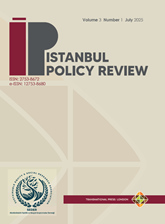Call for Papers for a special issue! Societal Violence – Analyzing the Role and Impact of State and Individual Actions from Legal, Historical, and Contemporary Perspectives.
Istanbul Policy Review invites papers for a special issue titled " Societal Violence – Analyzing the Role and Impact of State and Individual Actions from Legal, Historical, and Contemporary Perspectives.". The third issue of the Journal aims to cover scholarly debates and research on the contemporary challenges of our times.








 Copyright © 2022 Transnational Press London | All rights reserved | Istanbul Policy Review is a trademark of Transnational Press London Ltd., Company registered in England and Wales No. 8771684.
Copyright © 2022 Transnational Press London | All rights reserved | Istanbul Policy Review is a trademark of Transnational Press London Ltd., Company registered in England and Wales No. 8771684.